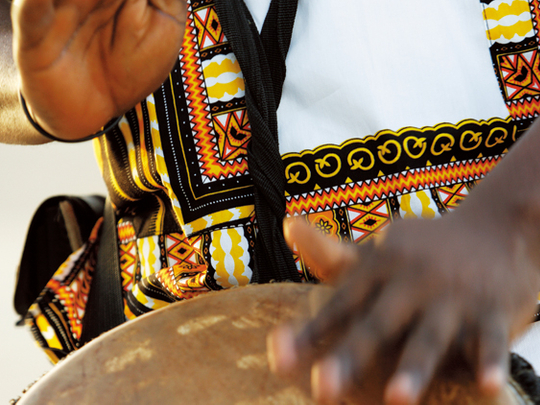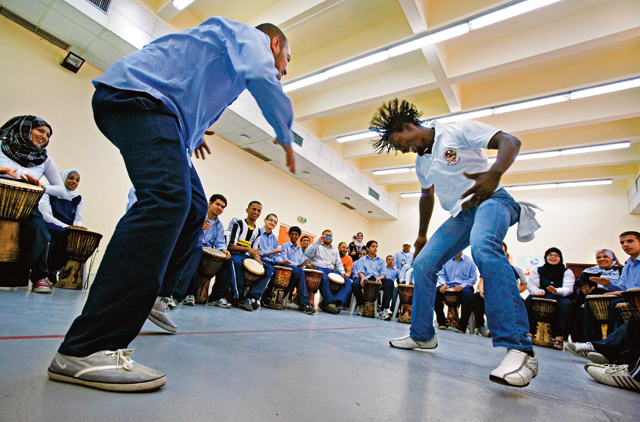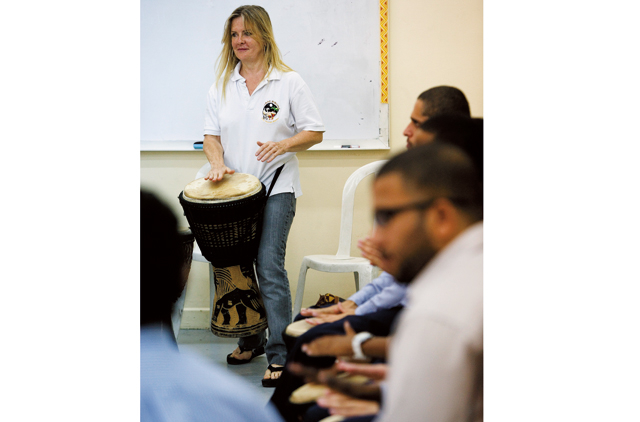
I spoke only English. The two students I was to interview understood only sign language. But just hours before we met in the principal's office at the Al Amal Kindergarten and School for the Deaf in Sharjah, they were playing African djembe drums that they couldn't hear. I heard - and was amazed.
The ensemble of about 30 students whose collective hearing disability is termed as severe to profound - for you and me this means they can hear only sounds higher than that produced by a jet engine - played in sync to Julie-Ann Odell's visual cues last month. The otherwise silent school roused to life with sounds of thundering drumbeats. While the students had little difficulty picking up the primary notes - bass, tone and slap of the drum - Odell had to stop herself from saying, "Listen to me".
It was her second drumming workshop at the non-profit school. (She conducted the first one in March.) The drum circle facilitator and founder of Dubai Drums, who runs corporate team-building drumming sessions, had to abandon her familiar verbal teaching method for an unfamiliar approach - using facial expressions and hand gestures. The students on the other hand, were at ease, barely able to conceal their happiness.
Odell's thumbs-up gesture meant the students were doing well. Both hands placed on her heart translated into joy. The act of hugging - in the air - showed love. High-fives were demonstrated too when she raised her hand to a fellow drummer. The students did the same among themselves. Later I learnt that during the workshop they were talking to each other, expressing how much fun it was.
Then the unexpected happened. Odell signalled team member Edward Dogbe, a Ghanaian drummer and dancer, to break into a tribal dance, and in turn, he signalled for the students to join him. A teenager jumped up with alacrity and followed Dogbe's every move.
Had you to walk into that hall reverberating with rhythmic drumbeats, you would not have known that these drummers have hearing disabilities, unless you noticed their hearing aids.
The djembe drum dates to AD500 and is originally from Mali. The name djembe originates from the wood of the tree used to make the drum and is regarded as a sacred instrument. It is used for various ceremonies from birth, death, harvest to rites of passage.
Back at the principal's office, Bassem Abdul Gaffar, technical director of the school, talked about Odell's connection.
"I happened to watch a performance by Dubai Drums with my daughter at a mall in Sharjah. I realised that something like this could work with our students so I got in touch with Julie-Ann, and asked her if she would cooperate with us," said Gaffar.
At the beginning, it was uncertain whether the students would be able to participate given that they rely on sign language and lip-reading. The students themselves weren't sure, asking questions like, "Are we really going to go do that?" and, "We can't hear, so how will we drum?"
The younger students weren't as apprehensive. Gaffar said, "[During the first workshop] the older students didn't expect to be able to drum. They snuck into the hall to watch the first group of younger students. Soon they realised that they could do it too. After the session, they wanted Julie-Ann to visit again."
As they watched the older students drum, both Gaffar and Odell saw that a few had latent talent for music, emboldening them to think of ways to create something of higher significance.
Gaffar said, "Some of them are gifted. For example, the student who danced today was moving to a beautiful rhythm; remarkable for someone with hearing disability. So Julie-Ann and I discussed possibilities. She suggested a professional group as a vehicle for an awareness campaign. Think about it… there is nothing exclusive to hearing-impaired students. They interact through the same channels we interact with one exception - they add more weight on gestures. Julie-Ann said she would select ten to 15 students and train them. For this to happen, we will require funding, and the school is open to the idea of sponsorship."
Odell, who was also in the office, said, "The students want it. The school wants it. We can perform around the UAE to show that those with hearing disabilities can do what everybody else does."
This sentiment was reiterated as Gaffar spoke about the school's curricula. "Even though it [curricula] is based on sign language, it is the same for all students as directed by the Ministry of Education. After our students pass their high school diploma, they take up university studies like everybody else."
It was this belief that inspired Odell to visit the school. She said, "In the past ten years that I've used rhythm as a tool for team building and community empowerment, I've learnt that it transcends all boundaries. When Gaffar spoke to me, I thought it'd be amazing if I could facilitate the same joy and happiness [as experienced in her regular drumming workshops]. Further, I had the universal language of rhythm to communicate. So what if the students cannot hear? They can listen with their hearts."
The only part that Odell had to adapt was her teaching method. "I had to shift into non-verbal communication and remind myself not to speak out instructions," she said.
Thus the students, who placed the djembe drums between their knees while seated, felt the sound vibrate through their bodies. Odell explained, "It is a membrane instrument. You feel the vibration through your body including your hands and heart. In a way, it is one of humankind's oldest instruments. In our DNA is the knowledge that we have drummed together as a tribe. Drumming taps into this collective knowledge. The students have discovered something, which helps them communicate without having to speak in sign language."
The effect of this discovery shone on the faces of the students. Odell said, "I didn't expect this level of success yet this is what I was hoping for. Everyone could see how joyous they were having achieved something together without any need for communication. In my regular workshops, there is always someone out of rhythm because people aren't listening. Here at the school, they were truly listening with their heart. When I signalled to stop drumming, everyone stopped at the same time. It was amazing. They didn't need any other form of communication."
The person who needed it was I, starting with a bilingual translator and sign language interpreter to interview the students. The interpreter, Wael Samir, deciphered the spoken and visual cues on either end of the human message service chain.
Students Asseel Faisal and Abdul Salam Zorab along with former student and art teacher Mohammad Abu Zahra, were beaming. Asseel could barely hide her excitement after the drumming workshop. "She [Julie-Ann] makes me happy. It was my first time and I was successful. I played music! I felt the vibration through my whole body."
Next to her was Abdul Salam, the frisson of excitement still palpable, and nodding in agreement to Asseel's reaction. He said, "I loved dancing with Edward. I looked at how he was moving and followed him. It felt more like sport."
At that juncture, I learnt about Abdul Salam signing up for professional classes with Dubai Drums after the first drumming session at the school. He continued, "I loved it so much. I would like to go every week, but my exams are approaching. I love what they do and will practice after the exams."
Abu Zahra, however, didn't drum that day, but said he witnessed the amazing experience. "As an art teacher I have seen my students express themselves with sketches and paints. To do this, it takes practice. Today they expressed themselves right away through drumming. We have always wanted to enjoy music, but have never been able to, until today."
Making a difference
Who: Julie-Ann Odell, drum circle facilitator and founder of Dubai Drums
What: Conducted a drumming workshop with students with hearing disability
Where: Al Amal Kindergarten and School for the Deaf, Sharjah
Inside info
To know more about Dubai Drums visit www.dubaidrums.com
By the way…
When you interact with people with hearing disabilities:
- Use more facial expressions and gestures.
- Look at the person you are speaking to, not an interpreter (if present).
- Do not shout or stop speaking.
- Explore other forms of communication like writing and lip-reading.













